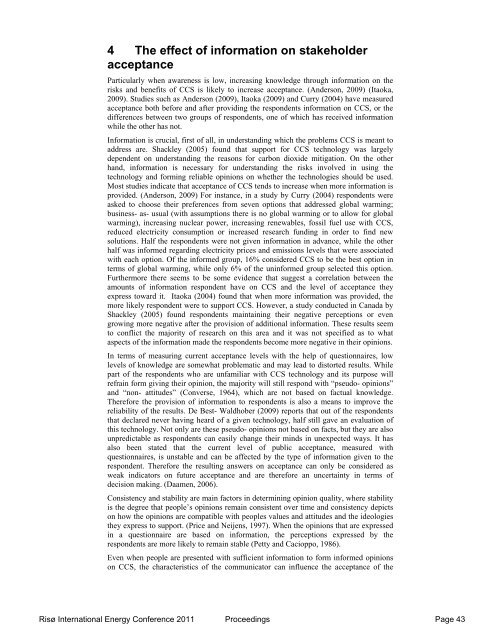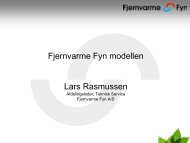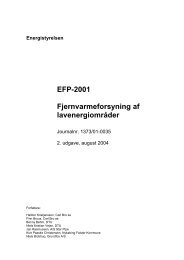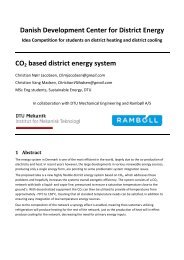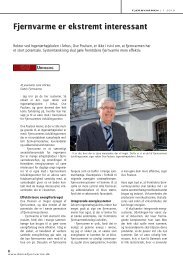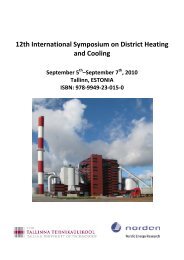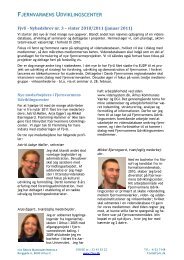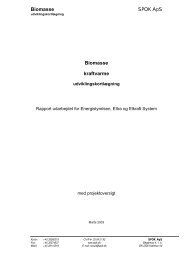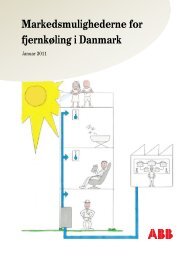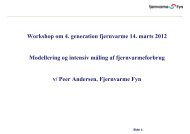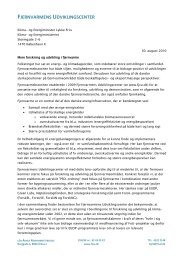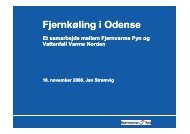Energy Systems and Technologies for the Coming Century ...
Energy Systems and Technologies for the Coming Century ...
Energy Systems and Technologies for the Coming Century ...
Create successful ePaper yourself
Turn your PDF publications into a flip-book with our unique Google optimized e-Paper software.
4 The effect of in<strong>for</strong>mation on stakeholderacceptanceParticularly when awareness is low, increasing knowledge through in<strong>for</strong>mation on <strong>the</strong>risks <strong>and</strong> benefits of CCS is likely to increase acceptance. (Anderson, 2009) (Itaoka,2009). Studies such as Anderson (2009), Itaoka (2009) <strong>and</strong> Curry (2004) have measuredacceptance both be<strong>for</strong>e <strong>and</strong> after providing <strong>the</strong> respondents in<strong>for</strong>mation on CCS, or <strong>the</strong>differences between two groups of respondents, one of which has received in<strong>for</strong>mationwhile <strong>the</strong> o<strong>the</strong>r has not.In<strong>for</strong>mation is crucial, first of all, in underst<strong>and</strong>ing which <strong>the</strong> problems CCS is meant toaddress are. Shackley (2005) found that support <strong>for</strong> CCS technology was largelydependent on underst<strong>and</strong>ing <strong>the</strong> reasons <strong>for</strong> carbon dioxide mitigation. On <strong>the</strong> o<strong>the</strong>rh<strong>and</strong>, in<strong>for</strong>mation is necessary <strong>for</strong> underst<strong>and</strong>ing <strong>the</strong> risks involved in using <strong>the</strong>technology <strong>and</strong> <strong>for</strong>ming reliable opinions on whe<strong>the</strong>r <strong>the</strong> technologies should be used.Most studies indicate that acceptance of CCS tends to increase when more in<strong>for</strong>mation isprovided. (Anderson, 2009) For instance, in a study by Curry (2004) respondents wereasked to choose <strong>the</strong>ir preferences from seven options that addressed global warming;business- as- usual (with assumptions <strong>the</strong>re is no global warming or to allow <strong>for</strong> globalwarming), increasing nuclear power, increasing renewables, fossil fuel use with CCS,reduced electricity consumption or increased research funding in order to find newsolutions. Half <strong>the</strong> respondents were not given in<strong>for</strong>mation in advance, while <strong>the</strong> o<strong>the</strong>rhalf was in<strong>for</strong>med regarding electricity prices <strong>and</strong> emissions levels that were associatedwith each option. Of <strong>the</strong> in<strong>for</strong>med group, 16% considered CCS to be <strong>the</strong> best option interms of global warming, while only 6% of <strong>the</strong> unin<strong>for</strong>med group selected this option.Fur<strong>the</strong>rmore <strong>the</strong>re seems to be some evidence that suggest a correlation between <strong>the</strong>amounts of in<strong>for</strong>mation respondent have on CCS <strong>and</strong> <strong>the</strong> level of acceptance <strong>the</strong>yexpress toward it. Itaoka (2004) found that when more in<strong>for</strong>mation was provided, <strong>the</strong>more likely respondent were to support CCS. However, a study conducted in Canada byShackley (2005) found respondents maintaining <strong>the</strong>ir negative perceptions or evengrowing more negative after <strong>the</strong> provision of additional in<strong>for</strong>mation. These results seemto conflict <strong>the</strong> majority of research on this area <strong>and</strong> it was not specified as to whataspects of <strong>the</strong> in<strong>for</strong>mation made <strong>the</strong> respondents become more negative in <strong>the</strong>ir opinions.In terms of measuring current acceptance levels with <strong>the</strong> help of questionnaires, lowlevels of knowledge are somewhat problematic <strong>and</strong> may lead to distorted results. Whilepart of <strong>the</strong> respondents who are unfamiliar with CCS technology <strong>and</strong> its purpose willrefrain <strong>for</strong>m giving <strong>the</strong>ir opinion, <strong>the</strong> majority will still respond with “pseudo- opinions”<strong>and</strong> “non- attitudes” (Converse, 1964), which are not based on factual knowledge.There<strong>for</strong>e <strong>the</strong> provision of in<strong>for</strong>mation to respondents is also a means to improve <strong>the</strong>reliability of <strong>the</strong> results. De Best- Waldhober (2009) reports that out of <strong>the</strong> respondentsthat declared never having heard of a given technology, half still gave an evaluation ofthis technology. Not only are <strong>the</strong>se pseudo- opinions not based on facts, but <strong>the</strong>y are alsounpredictable as respondents can easily change <strong>the</strong>ir minds in unexpected ways. It hasalso been stated that <strong>the</strong> current level of public acceptance, measured withquestionnaires, is unstable <strong>and</strong> can be affected by <strong>the</strong> type of in<strong>for</strong>mation given to <strong>the</strong>respondent. There<strong>for</strong>e <strong>the</strong> resulting answers on acceptance can only be considered asweak indicators on future acceptance <strong>and</strong> are <strong>the</strong>re<strong>for</strong>e an uncertainty in terms ofdecision making. (Daamen, 2006).Consistency <strong>and</strong> stability are main factors in determining opinion quality, where stabilityis <strong>the</strong> degree that people’s opinions remain consistent over time <strong>and</strong> consistency depictson how <strong>the</strong> opinions are compatible with peoples values <strong>and</strong> attitudes <strong>and</strong> <strong>the</strong> ideologies<strong>the</strong>y express to support. (Price <strong>and</strong> Neijens, 1997). When <strong>the</strong> opinions that are expressedin a questionnaire are based on in<strong>for</strong>mation, <strong>the</strong> perceptions expressed by <strong>the</strong>respondents are more likely to remain stable (Petty <strong>and</strong> Cacioppo, 1986).Even when people are presented with sufficient in<strong>for</strong>mation to <strong>for</strong>m in<strong>for</strong>med opinionson CCS, <strong>the</strong> characteristics of <strong>the</strong> communicator can influence <strong>the</strong> acceptance of <strong>the</strong>Risø International <strong>Energy</strong> Conference 2011 Proceedings Page 43


